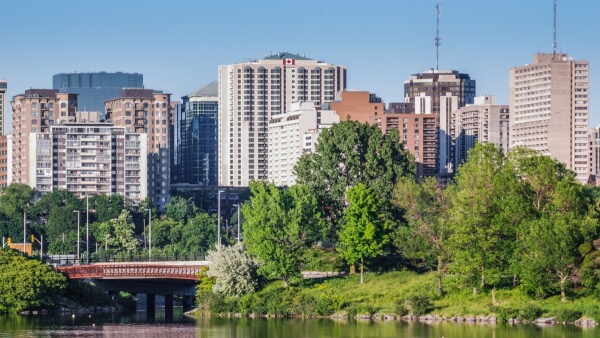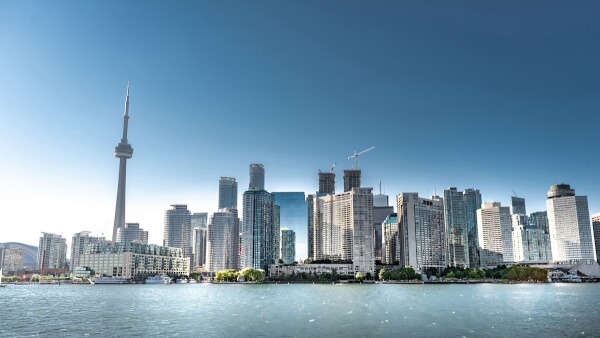How to import a car from Canada to the US
Bringing a car from Canada back to the US? Find out how to import a vehicle, including compliance tips and applicable fees.

Thinking about buying property in Canada or already own a place north of the border? Then you should also think about property taxes in Canada and how much to budget for them every year.
These annual taxes fund local services like schools, roads, and emergency services, but you're on the hook for different amounts depending on where in Canada your property is located. Different municipalities charge different rates, anywhere from under 0.3% of your property value to over 2%.¹
Managing finances across two countries can get complicated, especially when it comes to large payments like property taxes.
We'll also introduce Wise — your international money transfer alternative. Use Wise to send stress-free transfers to over 140 countries - all at the standard mid-market exchange rate.
| Table of contents |
|---|
Property taxes in Canada are annual fees levied by municipal governments on real estate owners. These taxes fund essential local services, such as public schools, police and fire departments, road maintenance, waste collection, and municipal infrastructure projects.
Canadian property taxes are calculated based on your property's assessed value multiplied by the local tax rate, known as the mill rate. A government assessor determines your property's market value, typically every few years, considering factors like location, size, condition, and recent sales in your area.
Property tax rates in Canada are different across the country. Each province sets its own assessment and taxation framework, and then delegates the tax collection to municipalities.
This means that your property tax bill depends on where your property is located. For example, property taxes in Toronto will be different from those in Vancouver, Calgary, or Halifax, and not just in amount, but also in how they're calculated and when they're due.
| 💡 Learn more about buying property in Canada. |
|---|
In Canada, provinces with expensive housing and big cities usually have lower tax rates. Provinces with cheaper homes and smaller populations often have higher rates.
Here's what you can expect at a glance:
| Province/municipality | Average property tax rate |
|---|---|
| British Columbia² | 0.29% |
| Alberta³ | 0.64% |
| Ontario⁴ | 0.71% |
| Quebec⁵ | 0.71% |
| Manitoba⁶ | 2.72% |
| Saskatchewan⁷ | 1.33% |
| Saint John (New Brunswick)⁸ | 1.58% |
| Halifax (Nova Scotia)⁹ | 1.10% |
| Charlottetown (Prince Edward Island)¹⁰ | 1.67% |
Tax rates vary within each province, too. For example, Vancouver and Victoria in British Columbia will have different rates, but they won't be drastically different from each other.
Manitoba stands out with the highest rates at 2.72%, which is more than nine times higher than British Columbia's 0.29%. The Prairie provinces generally have higher rates, with Saskatchewan at 1.33%.
British Columbia offers the lowest rates of 0.29%, followed by Alberta at 0.64%. Ontario and Quebec are tied at 0.71%, making them middle-ground options for property tax costs.
Property tax is property tax, but different types of properties get taxed differently depending on where you live.
Take Toronto, for example. There, they break down property taxes into several categories with different rates for each (keep in mind that these percentages are rounded up):¹¹
- Residential properties pay 0.75%
- Multi-residential properties pay 1.20%
- New multi-residential gets the same rate as regular residential at 0.75% to encourage new construction
- Commercial properties pay 2.28%
- Industrial properties pay 2.38%
- Pipelines pay 2.04%
- Farmlands and managed forests get a break at just 0.19%
As an American buying Canadian property, you'll most likely deal with residential property taxes. Keep in mind that residential property taxes usually apply if you're buying land in Canada, too, not just a house.
Canadian property taxes use this formula: your property's assessed value multiplied by the local tax rate.
For example, let's say you buy a condo in Toronto worth 800,000 CAD. The city assesses your property at that value, then applies Toronto's residential tax rate of 0.754087% (which includes city tax, education tax, and building fund contributions).¹¹
Your annual property tax would be: 800,000 × 0.754087% = 6,033 CAD
Compare this to a similar 800,000 CAD property in Vancouver, where British Columbia's average rate is just 0.29%.² You'd pay: 800,000 × 0.29% = 2,320 CAD, which is nearly three times less than in Toronto.
That same 800,000 CAD might buy you a much larger home in Winnipeg, Manitoba, where property tax rates hit 2.72%.⁶ Your tax bill would jump to 21,760 CAD annually, but you'd also likely get significantly more house for your money.
It depends on your municipality, but you'll typically have a few different convenient options.
Most property owners can pay through online banking. You'll just need to add your municipality as a payee using your property tax account number. You can also usually pay by mail with a check, visit municipal offices in person, or set up automatic payments through your bank.
If you have a mortgage in Canada, some lenders offer to collect property taxes monthly along with your mortgage payment. They'll then pay the municipality directly when taxes are due. This can be a good option, since you'll be able to spread the cost over 12 months instead of paying one large annual bill.
For questions about payment methods, due dates, or your property tax bill, contact your local municipal tax office directly. They're usually listed on your property tax statement, or you can find them on your city or town's website.
Missing property tax deadlines or filing incorrect information comes with penalties that'll vary by municipality. Typically, you'll have to pay late payment fees, either as a flat rate or with interest charges.
Contact your local municipal tax office if you're having trouble making payments. Some governments may offer payment plans or hardship programs to help property owners avoid penalties.
Property tax amounts in Canada depend on your property's assessed value and geographical location. For example, an 800,000 CAD home would cost you about 2,320 CAD annually in British Columbia, 6,033 CAD in Toronto, and 21,760 CAD in Winnipeg.
Property tax rates can be as low as 0.29% in British Columbia to as high as 2.72% in Manitoba. Property values vary, too.²⁶
Canadian property taxes fund essential local services that some other countries handle differently. Your property tax bill pays for public schools, police and fire departments, road maintenance, public transit, waste collection, parks, and local infrastructure.
In provinces with lower property values, municipalities need higher tax rates to generate enough revenue for these services. But areas with expensive real estate can charge lower rates because the higher property values still produce enough tax revenue.
Yes, most provinces charge a one-time property transfer tax when you buy land or property. This is separate from annual property taxes. Then you'll also pay regular property taxes (typically, residential ones) on your land every year.
Canada generally has higher property tax rates than the US. However, this comparison gets complicated because of different assessment methods, service levels, and what's included in property taxes. Some US states have very high property taxes (like New Jersey at 2.23%) that exceed most Canadian provinces, and others are much lower.¹²
Canadian property taxes are a big expense that you have to budget for every year. They can vary widely by location, going as low as 0.29% in British Columbia to as high as 2.72% in Manitoba.²⁶
However, these taxes fund essential public services like public schools and road maintenance.
| Wise can help you get a better deal on currency conversion. You can convert over 40 currencies at the standard mid-market exchange rate, and we'll show you the fees upfront so you know exactly how much you're paying. |
|---|
Get a Wise Account
in minutes 💰
Sources
Sources checked 09/12/2025
*Please see terms of use and product availability for your region or visit Wise fees and pricing for the most up to date pricing and fee information.
This publication is provided for general information purposes and does not constitute legal, tax or other professional advice from Wise Payments Limited or its subsidiaries and its affiliates, and it is not intended as a substitute for obtaining advice from a financial advisor or any other professional.
We make no representations, warranties or guarantees, whether expressed or implied, that the content in the publication is accurate, complete or up to date.

Bringing a car from Canada back to the US? Find out how to import a vehicle, including compliance tips and applicable fees.

Learn the boat import duty from Canada to the US: rates, taxes, paperwork and required documentation, NAFTA/USMCA rules, exemptions, and timeline.

Are you looking for the best property management companies in Ottawa? Find out all about the top local providers to take care of your home overseas.

Are you looking for the best Airbnb management companies in Toronto? Find out all about the top local providers to take care of your rental property overseas.

Moving to Canada from the US? This guide covers all the essential information for relocating to Canada as an American, including tips and insights.

Are you looking for the best property management companies in Toronto? Find out all about the top local providers to take care of your home overseas.